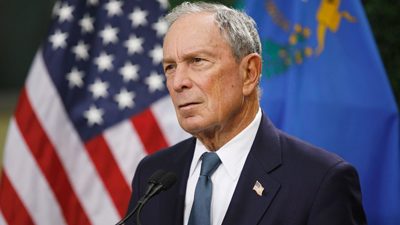
By Emily Larsen,
Associated Press,

Michael Bloomberg dropped out of the Democratic presidential race and endorsed Joe Biden, marking the end of a high-spending, self-funded campaign that rejected conventional campaign tactics.
His announcement comes as early results in Super Tuesday states show that he failed to become the choice of centrists as dropout candidates and Democratic leaders coalesced around the former vice president in the days before the Super Tuesday contests.
“I’m a believer in using data to inform decisions. After yesterday’s results, the delegate math has become virtually impossible – and a viable path to the nomination no longer exists,” Bloomberg said in a statement released March 4, the day after the elections.
He endorsed centrist ally Biden in an apparent bid to stop socialist Vermont Sen. Bernie Sanders from winning the Democratic presidential nomination.
“I’ve always believed that defeating Donald Trump starts with uniting behind the candidate with the best shot to do it. After yesterday’s vote, it is clear that candidate is my friend and a great American, Joe Biden,” Bloomberg said.
He joins fellow dropout candidates former South Bend, Indiana, Mayor Pete Buttigieg, Minnesota Sen. Amy Klobuchar and former Texas Rep. Beto O’Rourke in backing Biden as the last remaining centrist alternative to Sanders.
Bloomberg, 78, made his late entry into the Democratic presidential field in November, reportedly deciding to run after Biden faltered in the polls. His expensive, unconventional campaign met with criticism from his rivals and party insiders.
The former New York City mayor and financial software mogul’s estimated $56 billion net worth allowed him near-unlimited cash to spend on his bid, and he refused to accept outside donations. Bloomberg placed $37 million in television ads nationwide, setting a record for money spent on presidential campaign television ads in one week.
In total, Bloomberg spent $558 million on digital and television advertisements over the course of his campaign, according to ad tracking firm Advertising Analytics, plus more spent on more than 2,000 high-paid staff and other campaign operations.
Despite losing the presidential nomination, Bloomberg has committed to keeping a team of about 500 staff members intact in battleground states through November in order to run operations to defeat President Trump.
Rival candidates scolded Bloomberg for his massive personal spending. Massachusetts Sen. Elizabeth Warren accused Bloomberg of trying to buy the presidency.
Bloomberg skipped competing in the first four nominating contests in Iowa, New Hampshire, South Carolina and Nevada and instead directed resources across Super Tuesday states that were expensive for his competitors to reach. The tactic angered party officials in the early states, who argued candidates should demonstrate traditional grassroots strength.
Rising left-wing factions in the Democratic Party proved to be a challenge for Bloomberg. In the weeks before he launched his campaign, Bloomberg apologized for supporting stop-and-frisk policing tactics that he pushed while he was the mayor of New York City, and his campaign team apologized for his past comments disparaging women.
Democratic presidential debates exposed a stiff candidate unprepared to rebut harsh attacks on his record and alleged treatment of women, particularly from Warren.
“None of them accused me of doing anything, other than maybe they didn’t like a joke I told,” Bloomberg said of the allegations during his first debate, prompting groans from the audience.

Be the first to comment